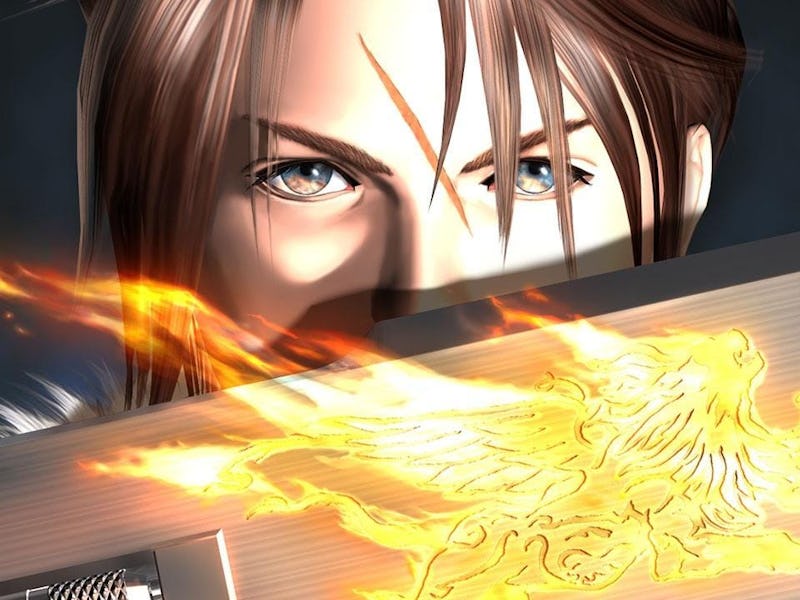25 Years Later, the Most Overlooked Final Fantasy Deserves More Credit
A true classic.

Final Fantasy 8 had the impossible task of following up on Final Fantasy 7, a game that took the world by storm and completely redefined the medium as a whole. There was simply no way it could reach those same heights, and for decades, the eighth entry has lived in its predecessor's shadows. While some of the game's ideas might be misguided, Final Fantasy 8 is still a visionary title that wasn’t content to simply bask in the success of its predecessor but wanted to redefine the franchise in new ways. Twenty-five years later, it simply deserves more credit.
What truly makes Final Fantasy 8 so compelling is simply how different from the entire rest of the franchise it is. On the heels of its most successful game ever it wouldn’t have been surprising to see Square Enix play it safe, but it's bonkers just how much the next entry deviated from that formula. Final Fantasy 8 eschews so many of the tenets and rules that Final Fantasy had established, striking out in ambitious new areas, in terms of mechanics, themes, and storytelling. Even the game’s setting itself is fully modern, and downright sci-fi in some places.
Final Fantasy 8’s does a great job with its contemporary setting, while still managing to loop in some sci-fi surprises.
At its core, Final Fantasy 8 is a deeply personal love story. Yes, there are time-traveling witches and all, but the heart of the story revolves around Squall and Rinoa’s growing love, and how they both learn to be better people through that. Final Fantasy X would follow in these footsteps later, but for all purposes, eight is the first true love story of the series, and it pulls it off marvelously.
That personal connection is what makes Final Fantasy 8’s narrative so memorable because everything quite literally revolves around the main party. There’s a real sense of camaraderie built between the main party, and some fascinating relationships that are built. The bulk of Final Fantasy 8’s narrative is focused on building these relationships, but Square Enix cleverly paces out multiple major crescendos and unforgettable set pieces that intentionally put the party under duress. Moments like Edea’s assassination and the Battle of Gardens don’t just push the overarching narrative forward, but also provide meaningful context for the party’s development.
There are some, admittedly, ludicrous twists near the end of Final Fantasy 8, but its narrative still stands out as some of the most compelling character-focused storytelling the franchise has seen. Even the very structure of how the game tells its story feels so unique, with Laguna’s flashbacks introducing a secondary protagonist and a layer of dreamlike mystery.
Final Fantasy 8’s romance gives the game a strong emotional core that carries through to the very end.
Of course, story isn’t the only place Final Fantasy 8 deviated from the norm, as its gameplay mechanics are arguably more divergent. The pillars of Final Fantasy 8’s systems are Guardian Forces (Summons), Drawing, and Junctioning. These systems are inexplicably linked together, letting you essentially equip summons and magic on each character to imbue them with different abilities and alter their stats. The catch is that you need to draw magic from enemies and the world, essentially turning magic spells themselves into a resource, rather than having the resource of MP.
Wrapping our head around the Junction system was tough at first, but once you get it down it’s clear that you can break the game wide open with it. Dismantling items or valuable cards you win in the game’s fantastic Triple Triad mini-game can get you high-level spells early on. There are little tricks you can use to power up your characters, like Junctioning Pain to attack to inflict status effects, or how Junctioning Meteor can give you massive HP boost and save your Cure spells.
Final Fantasy 8 is a very systems-heavy RPG, and taking the time to learn those systems gives you an absurd amount of control over the game, in a way that other Final Fantasy titles haven’t met. Final Fantasy games aren’t shallow, but they traditionally have fairly streamlined systems in order to keep the experience light and breezy.
The Draw and Junction systems seem absurdly complex at the start, but mastering them lets you break the game in amusing ways.
Final Fantasy 8 feels like the opposite of that, and it absolutely isn’t for everyone. It’s a game that’s complex and convoluted on a ridiculous scale, but that’s exactly what makes it so charming. There’s still that heartfelt main story at its core, but mastering the systems lets you engage with a wealth of hidden side content that’s far more challenging, like the brutal Omega Weapon fight.
Final Fantasy 8 isn’t the most influential entry, but it might be the one that captures the spirit of the series the best. Final Fantasy has always been about experimentation and pushing the envelope, and Final Fantasy 8 fits that to a tee. It’s messy and beautiful all at once, a diamond in the rough that’s only gotten more brilliant with time.